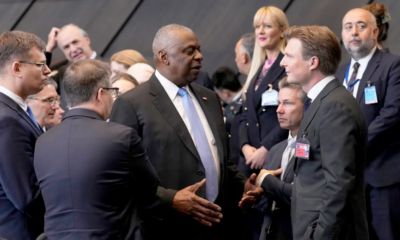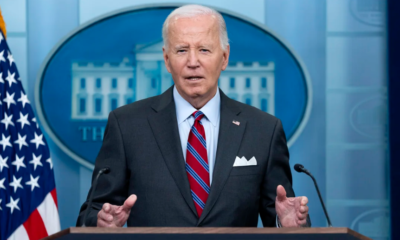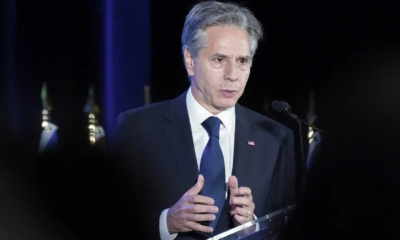Politics
Misinformation and Foreign Interference Challenge U.S. Election Security, Experts Warn
While the recent U.S. presidential election was largely smooth, with high voter turnout and minimal disruptions, experts are raising alarms over growing foreign interference and the rise of misinformation aimed at undermining public trust in the electoral system. This trend is expected to escalate in the coming years, experts say.
In the months leading up to the election, Russia, China, and Iran increased their use of English-language disinformation campaigns targeting American voters. Federal officials warned that these adversaries sought to exploit social media platforms and fake websites to sow doubts about election integrity and stir political chaos. Notably, Russia was active in spreading staged videos intended to damage the reputations of Vice President Kamala Harris and her running mate, Minnesota Governor Tim Walz. The Kremlin also paid a Tennessee media company nearly nine million euros to produce pro-Russian content.
“Russia clearly interfered in this election,” said Brian Taylor, a political science professor at Syracuse University. “Their goal was to create division and chaos, though there is no evidence that their activities altered the election outcome.”
Experts argue that foreign adversaries, especially Russia, are playing a long game. Their aim is not only to influence elections but also to undermine American democracy and weaken the U.S. over time. “What Russia is trying to do is steer the United States in a particular direction, regardless of who wins the election,” said Emerson Brooking, a senior fellow at the Atlantic Council’s Digital Forensic Research Lab.
Both Russia and China have denied involvement in U.S. election meddling. Nevertheless, federal agencies, including the FBI, acted swiftly to identify and debunk false claims, such as a viral video alleging voter fraud in Georgia. Steve Simon, president of the National Association of Secretaries of State, praised the federal response, highlighting the importance of quick action to limit the spread of disinformation.
Despite these efforts, the problem of foreign interference persists. Kim Wyman, former head of the U.S. Cybersecurity and Infrastructure Security Agency, warned that such attempts would continue in future elections. “This election demonstrated that foreign adversaries are still trying to influence U.S. elections,” she said.
On Election Day itself, the most significant challenge came in the form of bomb threats reported in five battleground states, which briefly disrupted some polling places. Despite this, the election proceeded largely as expected, with high turnout and relatively few technical issues. The widespread use of early voting, which saw over 84 million ballots cast, helped alleviate pressure on Election Day and ensured election workers had time to handle unexpected challenges.
David Becker, head of the Center for Election Innovation and Research, praised early voting efforts, noting that it helped mitigate some of the threats that emerged. Election officials across the country were also well-prepared for emergencies, with extensive training and coordination with law enforcement in the months leading up to Election Day.
“The system held up well under pressure,” said Carolina Lopez, a former election official. “Professionals knew exactly what to do when the unexpected happened.”
Politics
Chinese Students Shun U.S. Education as Concerns Mount Over Safety, Policies
The longstanding trend of Chinese students pursuing higher education in the United States is shifting as new statistics reveal a decline in their numbers, driven by safety concerns, changing perceptions of the American Dream, and more competitive options abroad.
For the first time since 2009, students from India have overtaken their Chinese counterparts as the largest group of international students in U.S. higher education. According to data released by the U.S. State Department and the Institute of International Education, Indian students accounted for 29% of international students in the 2022-2023 academic year, compared to China’s 25%.
Factors Behind the Decline
Experts attribute the drop in Chinese enrollment to a combination of geopolitical tensions, visa restrictions, and rising concerns about racism and safety in the U.S. These issues have been exacerbated by the COVID-19 pandemic, which saw a surge in anti-Asian hate crimes.
“Chinese students and families have become increasingly disillusioned with the American Dream,” said Mallie Prytherch, a researcher at the University of Hong Kong. “The onslaught of racism during Donald Trump’s presidency and the pandemic caused many to reconsider their options.”
The decline is also linked to U.S. policies. Visa restrictions, particularly for Chinese graduate students in science, technology, engineering, and mathematics (STEM) fields, have made studying in the U.S. more challenging. In 2020, over 1,000 Chinese students had their visas revoked due to national security concerns.
Even under President Joe Biden, many Trump-era policies have remained in place, discouraging Chinese students from pursuing U.S. education.
A Changing Global Landscape
Simultaneously, the global education market has evolved. Countries like Canada, the UK, and Australia have introduced immigration-friendly policies, making them attractive alternatives. Chinese universities, too, are gaining prestige, with many professors returning from the U.S. to teach at home.
“The quality of education in China has improved significantly,” Prytherch noted. “Students no longer feel that an American degree guarantees a competitive edge unless it’s from an Ivy League institution.”
Parents and students are also drawn to the perceived safety and stability of staying within China, particularly as the U.S. grapples with issues like gun violence and political polarization.
A Broader Shift in Priorities
The decline in Chinese students has implications for U.S. universities, which have long relied on tuition from international students. Despite this, some officials continue to promote the U.S. as a welcoming destination.
“We value Chinese students and want to ensure they feel welcome,” said Marianne Craven of the State Department.
However, for many Chinese families, the allure of the U.S. has dimmed. “China is not too bad anymore,” said one student Prytherch interviewed. “At least it’s safe.”
Politics
FBI Warns Trump Attorney of Phone Hack by Chinese Spies Amid Expansive Cyber Operation Targeting U.S. Officials
Politics
NATO Prepares for Possible US Shift in Ukraine Support Ahead of Presidential Election
-

 Business1 year ago
Business1 year agoSaudi Arabia’s Model for Sustainable Aviation Practices
-

 Business1 year ago
Business1 year agoRecent Developments in Small Business Taxes
-

 Politics1 year ago
Politics1 year agoWho was Ebrahim Raisi and his status in Iranian Politics?
-

 Business11 months ago
Business11 months agoCarrectly: Revolutionizing Car Care in Chicago
-

 Business11 months ago
Business11 months agoSaudi Arabia: Foreign Direct Investment Rises by 5.6% in Q1
-

 Technology1 year ago
Technology1 year agoComparing Apple Vision Pro and Meta Quest 3
-

 Politics1 year ago
Politics1 year agoIndonesia and Malaysia Call for Israel’s Compliance with ICJ Ruling on Gaza Offensive
-

 Sports10 months ago
Sports10 months agoKeely Hodgkinson Wins Britain’s First Athletics Gold at Paris Olympics in 800m





























